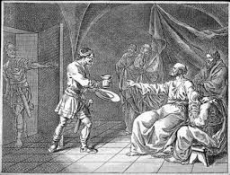
Email: ZYVC057@live.rhul.ac.uk
Total Article : 213
About Me:I'm a graduate student studying International Criminal Law and first started writing for King's News almost 4 years ago! My hobbies include reading, travelling and charity work. I cover many categories but my favourite articles to write are about mysteries of the ancient world, interesting places to visit, the Italian language and animals!

Socrates’ trial and execution occurred in 399 BC. The philosopher was charged for corrumpting the youth and impiety, that is absence of respect towards sacred things. Socrates’ death was ultimately the price he unfairly had to pay for asking questions and was sentenced to death by drinking poison. Two primary sources of his death are given by his students Plato and Xenophon and both acknowledge Socrates great use of discussions throughout his trial.
Upon narrating of Socrates’ trail, according to Plato the third argument Socrates made against his conviction is by far the most interesting, that of corrupting youth, to which he uses the example of horse trainers. Only a few people can train horses well, by analogy few people train horses the rest corrupt, argument by analogy. The leader has a comeback but doesn’t use it as it isn’t written, he never asked Socrates about horses as it is not the same is children. What is it to train young people or to corrupt them? Socrates’ own argument can be used against him but it doesn’t happen. He goes on explaining how most people in Athens have opinions but not knowledge as they don’t know what is true beauty ect, the contribute in the decisions for society but are usually ignorant. That is why Socrates has withdrawn himself from public life and invites others to do so as well. Out of ignorance people commit errors and vices. Knowledge is virtue. Once you know what justice is you are compelled to be just. Socrates continues by saying that had he corrupted the young it would have been out of ignorance, the answer would be to help Socrates grow and get trained. If you know what the good is you will not fail to be good, unless you are ignorant. For Augustine evil is knowingly doing something wrong. They cast a vote and Socrates is convicted, regarding the punishment Socrates suggests he should pay a fine and he should be re-educated, they could send him to exile but he wouldn’t stop doing philosophy. He is sent to death, Socrates says that without him Athens would lose something.
Nobody can truly know why Socrates’ prosecution was carried out. Some say Socrates was a threat as he mocked the authorities, he was the John Stuart of his day. Others say he made too many enemies over time, it still doesn’t draw the connection between losing the case and being unpopular. Socrates disobeyed the state in two incidences and both cases appeared to be fine, first in the Peloponnesian war then when the thirty tyrants were in charge as he didn’t arrest somebody he was ordered to, then the thirty tyrants got overthrown. In Greek society there was no notion of individuality, as a self-reflected person who makes his\her own decision, the Greeks make moral judgement in terms of effects of actions. Socrates insists on something beyond appeals of “this is our way”. Socrates states there is a little voice inside him and he listens to it. It could be our conscience but this term wasn’t accessible in ancient Greek, he is a threat in some way. Socrates asks a rather political question: why do we live this way and not another? Why do we have this society and not another? This curiosity unfortunately contributed to the tragic death of Socrates.
Image: http://www.rawstory.com/wp-content/uploads/2012/05/Chodowiecki_Socrates-e1338025232963.jpg

0 Comment:
Be the first one to comment on this article.